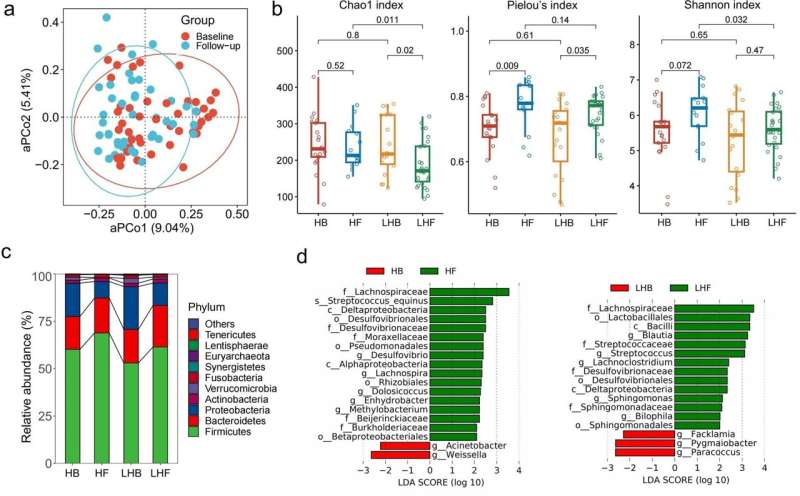April 11, 2023 report
This article has been reviewed according to Science X's editorial process and policies. Editors have highlighted the following attributes while ensuring the content's credibility:
fact-checked
peer-reviewed publication
trusted source
proofread
Probiotic company finds links between youthful gut microbiota and potential centenarians

With a growing body of scientific evidence illustrating the influence of gut microbiota on human health, researchers from AIage Life Science, a probiotics manufacturer in China, investigated the microflora inhabiting the guts of the world's healthiest people—centenarians.
In the paper, "Longevity of centenarians is reflected by the gut microbiome with youth-associated signatures," published in Nature Aging, the researchers studied the microbiomes of 1,575 individuals aged 20 up to 117, with 297 of them reported to be 100 years old or older. A Research Briefing on the study, titled "Youth-associated signatures in the gut microbiome of centenarians," has been published in the same journal issue.
Participants were evaluated in five age-related groups. Young adults (n = 314, 20–44 years), a middle-aged group (n = 277, 45–65 years), old adults (n = 386, 66–85 years), a nonagenarian group (n = 301, 90–99 years), and a centenarian cohort (n = 297, 100–117 years).
The researchers discovered that the gut microbiome signature in centenarians resembles that of young adults with an overrepresentation of Bacteroides spp., an increase in species evenness (species have a similar abundance), an enrichment of potentially beneficial species from the Bacteroidetes phylum and depletion of potential pathobionts (harmless but can become pathogenic under certain circumstances).
A smaller group of 45 centenarians was tested twice over a year and a half. Results from the group indicated that as centenarians age, the signature species evenness and low pathobionts continued to develop and were enhanced or conserved.
The researchers propose that this microbiome signature is associated with longevity, as they observed in their study, and state that this may counteract the senescence or chronic diseases that generally accompany aging, which this study could not have observed.
The researchers are currently isolating thousands of bacteria strains from the centenarians and testing their benefits on animal models in search of microorganisms that are able to extend the human lifespan. This future research should be incredibly useful to AIage Life Science, the company the researchers work for, as it already sells a probiotic product that claims to do just that.
How old?
A quick side note to anyone wondering if the oldest living person on the planet took part in this study (up to 117): It is unclear and remarkably unstated anywhere in the paper whether there is a participant who claims to be 117 years old, or if this is an arbitrary range on the part of the researchers. The way it is written implies the former and so must be explored briefly as it highlights a potential issue with interpreting the study.
The ages of the participants were derived by participant self-reporting (at some point in their lives) as birth records did not exist in Guangxi province before 1949. This places anyone over age 72 at the time of the study into the category of having an unverifiable age.
Unlike the West, there is no emphasis on staying young in Chinese culture, quite the opposite. It is possible that in a society where elders hold high status, some might seek to exaggerate when asked about their age. That or we can believe, without evidence, that the world's oldest living person wandered into a study on aging completely unnoticed.
According to the researchers, "All participants were community-dwelling and permanently lived in Guangxi province, China." The community is renowned for the high number of centenarians in the population. This is notably the same community that produced Luo Meizhen, a previous claimant to the world record for the oldest person ever to have lived, reaching the age of 127. Chinese authorities somehow confirmed her age, but it could not be verified otherwise because, again, no birth records existed in Guangxi province previous to 1949. There was also a potential math problem as she would have been 61 when giving birth to her son, which would have also made her the oldest person to have given birth at the time.
There are plenty of places in the world with people over the age of 100 that have verifiable birth records where this study could be repeated. Guangxi province in China will not be on that list for centenarians for at least another 26 years.
More information: Shifu Pang et al, Longevity of centenarians is reflected by the gut microbiome with youth-associated signatures, Nature Aging (2023). DOI: 10.1038/s43587-023-00389-y
Youth-associated signatures in the gut microbiome of centenarians, Nature Aging (2023). DOI: 10.1038/s43587-023-00395-0
© 2023 Science X Network




















